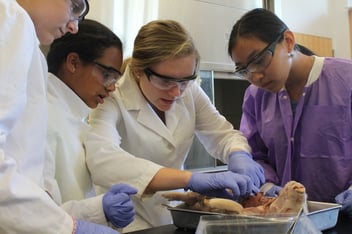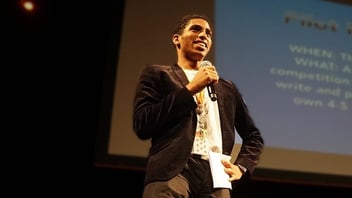Duality, Guilt + Stigmas: The Challenges Many First-Generation College Students Face

In a Washington Post article, Explo Trustee Dr. Linda Banks-Santilli brings to light the many repercussions first-generation college students are up against when they go to college.
A former first-generation college student, Dr. Linda Banks-Santilli, Explo Board Member and Associate Professor of Education at Wheelock College, speaks from research and experience. In a Washington Post article published this morning, Dr. Banks-Santilli lifts the veil on the numerous challenges many first-generation college students face, and discusses ways that colleges can be better at addressing them.
Going to College Can Cause a Family Rift
"Of the 7.3 million undergraduates attending four-year public and private colleges and universities," Banks-Santilli writes, "about 20 percent are first-generation students." And of those, around 50 percent come from racially-diverse low-income families.
When first-generation college students choose to go to college, they're choosing something different, something no one in their immediate (or even larger) family has (as of yet) experienced. This, Banks-Santilli writes, could lead to feelings of pride and joy amongst family members, but could also lead to a deep sense of separation. By choosing college, first-generation students are breaking up what's known as "intergenerational continuity" — each family's shared sense of experience — to pursue something that could fall outside their family's frame of reference. It's this "shift in identity," Banks-Santilli writes, that causes both a "sense of loss" and the need for students to develop "two different identities — one for home and another for college."
The Cultural Cost of Choosing College
A college or university degree can be seen as a way for first-generation students to "bring honor to their families," give back to their communities, or help their families find "a way out of poverty."
Students, Banks-Santilli writes, "may feel they’re abandoning parents or siblings who depend on them. And families, too, may have conflicted feelings: first-generation college students’ desire for education and upward mobility may be viewed as a rejection of their past. Perceived as different at home and at school, first-generation college students often feel like they don’t belong to either place."
Shouldering that burden of guilt is difficult enough. On top of that, Banks-Santilli writes, first-generation students arrive at school unprepared to handle the "1) professional, 2) financial, 3) psychological and 4) academic" challenges every college student faces. Right out of the gate, they are facing an uphill battle. According to Banks-Santilli, this is where colleges and universities can help the most.
Giving Students the Support They Need
First Lady Michelle Obama, U.S. Supreme Court Justice Sonia Sotomayor, and U.S. Senator from Massachusetts Elizabeth Warren: all were first-generation college students, and all can serve as an inspiration. For some first-generation students, their "background is viewed as a deficit," a potent demoralizing force. For other students, it's a galvanizing one, pushing them to achieve and excel at their dreams. All students, however, can benefit from professional mentorship, financial coaching, and an institutional support system that both addresses their needs and challenges and provides students with the educational foundation they need.
Read the rest of Banks-Santilli's Washington Post article, and find out more about her research.



